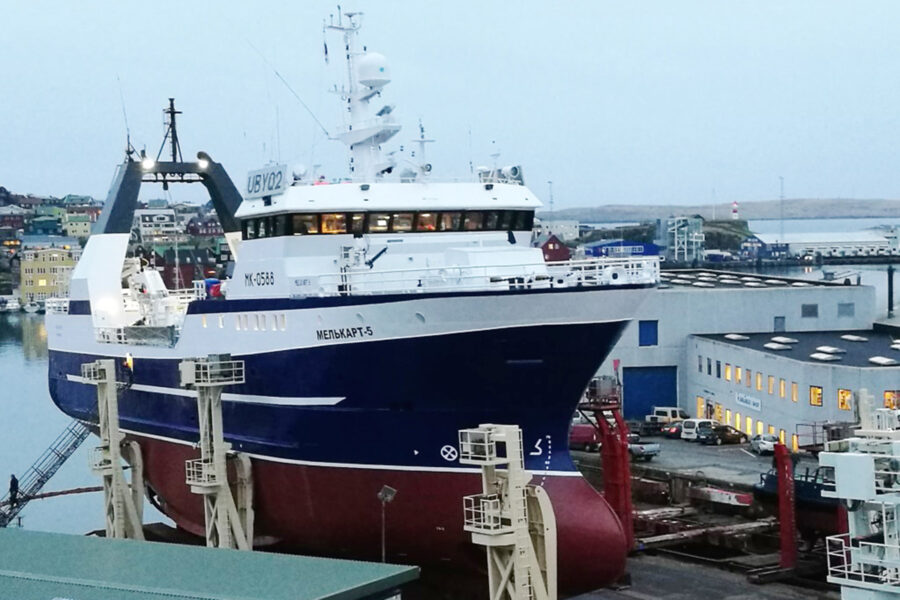The Faroe Islands continued to defy international opinion on sanctioning Russia last week, amid growing condemnation, reports Andy Read.
Criticism came from international fish processors, the fishing industry and the Marine Stewardship Council, which previously withdrew accreditation of several shared stocks after the Faroes joined other northern nations in ignoring scientific stock advice.
A spokesperson for the Faroe Islands government responded to questions from Fishing News, confirming that it was applying a loophole in the EU legislation imposing sanctions on Russia in response to its invasion of Ukraine. This allows exemptions for vessels sailing for ‘medical, food, energy and humanitarian purposes’.
This means that, in effect, the licensing of Russian vessels, quota access, fishing arrangements – including access of Russian vessels to the shared Faroe/UK Special Area – and the export of Faroese fish to Russia will continue unhindered by the new legislation passed in the Faroe parliament.
The spokesperson told Fishing News: “Russia and the Faroe Islands have for more than 40 years concluded annual fisheries agreements. The fisheries agreement between the Faroe Islands and Russia applicable for 2022, which was concluded in November 2021, does not allow the Faroe Islands to restrict access of Russian vessels to the Special Area during 2022.
“The Faroese government is nevertheless ready to conduct constructive talks with the United Kingdom on the management of the Special Area.”
It is understood, however, that although Faroe continues to export fish to Russia – filling the gap created in 2014 when the EU imposed restrictions on fish exports to Russia – Faroese processors are finding it harder to receive payments through the international banking system, as a result of sanctions, and this is likely to considerably slow down exports of its pelagic catches to Russia.
A spokesperson for a major Faroese exporter confirmed that it is now seeking to play ‘catch up’ with Norwegian, EU and UK processors, competing for new markets in West Africa and, ironically, Ukraine, where humanitarian efforts to help the growing refugee crisis have seen increased demand for pelagic products.
The Faroe government also remains unapologetic about its unilateral increase of its own TAC for blue whiting, which it then swapped with Russia for Barents Sea cod quota, saying: “With regard to blue whiting, the percentage of the Faroese quota in relation to the agreed TAC (total allowable catch) is the same this year as it was last year, and in previous years.
“However, there has been a 19% decrease in the TAC, as agreed by the coastal states and adopted by NEAFC, and subsequently a decrease in the quota set by the Faroe Islands for 2022, down from 330,158t in 2021 to 267,413t this year. In the absence of an agreed allocation for this stock, coastal states set their own quotas based on the agreed TAC.
“All coastal states, including the Faroe Islands, agree on the need to find a lasting sharing arrangement for the blue whiting to ensure the long-term sustainability of the fishery. The same applies to mackerel and Atlanto-Scandian herring.”
Speaking for the Scottish Pelagic Fishermen’s Association, a longstanding critic of both the support provided to Russian vessels, and the unilateral quota overshoots on blue whiting, Atlanto-Scandian herring and mackerel, CEO Ian Gatt told Fishing News: “With countries all around the world applying sanctions on Russia, it is deeply disappointing that Faroe has chosen to hide behind its fisheries agreement with the Putin government, the consequence of which is that Russian vessels continue to fish for blue whiting not only in Faroese but in UK waters.
“This is happening because of the special shared zone agreed between the UK and Faroe. For its part, the UK government must apply greater pressure on Faroe to suspend the zone.”
The Faroe Islands government statement comes after a number of meetings between key states, in theory to review scientific advice about the distribution of stocks – the northern nations had previously justified taking shares beyond those historically agreed as they claimed that stocks had moved further north, into their EEZs.
The meetings failed to make any breakthrough, with Faroe continuing to issue itself unilateral quotas.
The North Atlantic Processors’ Association (NAPA), representing the majority of buyers of northern pelagic landings, has been a vocal critic of the northern nations increasing their TACs against scientific advice.
NAPA project lead Dr Tom Pickerell said: “The status quo is unsustainable. There needs to be movement on quota shares, otherwise coastal states won’t stop overfishing these prime North East Atlantic pelagic stocks.
“This is another example of coastal states stepping away from collective responsibility, and genuine, collaborative decision-making – exactly the situation that NAPA has been advocating to avoid.”
Eco-label adds weight to pelagic dispute
The Marine Stewardship Council (MSC) added its voice ahead of crucial negotiations on quota allocations of the three major shared pelagic stocks, due to take place as Fishing News went to press, saying: “The MSC is calling on governments to reach a quota-sharing agreement during upcoming negotiations, which will be held between 11 and 13 May, to ensure future catches are within scientifically advised limits.”
In a fact sheet issued to delegates, the MSC pointed out the growing mismatch between quotas issued and scientific advice, which had led to the loss of eco-labels for all the stocks in question, and raised concerns about their long-term sustainability.
In 2021, the combined individual quotas for mackerel, Atlanto-Scandian herring and blue whiting exceeded ICES advice by 41%, 35% and 25% respectively.
The UK and EU pelagic sectors have long supported working within the scientific advice, and have been highly critical of the unilateral quota increases announced by the northern states, who have often been unable to catch the shares they have awarded themselves, particularly within their own EEZs.
This story was taken from the latest issue of Fishing News. For more up-to-date and in-depth reports on the UK and Irish commercial fishing sector, subscribe to Fishing News here or buy the latest single issue for just £3.30 here.








